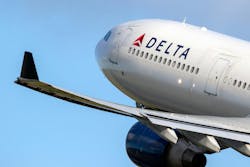Delta, Airbus expand partnership to advance aviation innovation
LAS VEGAS - Delta Air Lines in Atlanta and European aviation giant Airbus announced an expansion to their advanced aviation technologies and sustainable solutions collaboration. The companies announced the agreement at Delta’s CES 2025 keynote in Las Vegas. The partnership includes joint efforts through Airbus’ UpNext innovation lab and a commitment to sustainable aviation fuel (SAF) production at Minnesota’s SAF Hub. The partnership builds on previous collaborations between Delta and Airbus, such as exploring hydrogen-powered aircraft through Airbus’ ZEROe project.
Delta and Airbus are working together through their respective innovation labs, Delta’s Sustainable Skies Lab and Airbus UpNext. The collaboration focuses on developing and testing technologies to advance the future of aviation, such as fuel efficiency improvements, enhanced wing performance, superconductivity, and advanced aircraft assistance systems. Airbus will leverage its global network of labs to fast-track these innovations, while Delta will contribute real-world operational feedback, participate in experiment designs, observe testing, and potentially implement early-stage technologies on its fleet.
Delta will also take part in testing Airbus’ innovative "fello’fly" technique, which reduces fuel consumption by pairing aircraft in flight. Inspired by migrating geese, the lead aircraft generates an uplift that improves the efficiency of the following plane, a process known as wake energy retrieval. Airbus developed and refined this concept through its UpNext program and plans to conduct further flight tests with Delta in the second half of 2025 to assess its potential for large-scale implementation.
Related: Airbus taps BAE to provide energy storage solution for hybrid aircraft
Airbus is also committing to the Minnesota SAF Hub, a coalition for sustainable aviation fuel production. SAF, a near-term solution to reducing aviation’s climate impact, remains in short supply, with current production unable to meet demand. Airbus will support the SAF Hub and join a multi-year demand consortium to purchase SAF.
